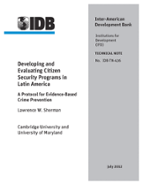Developing and Evaluating Citizen Security Programs in Latin America: A Protocol for Evidence-Based Crime Prevention
Date
Aug 2012
This protocol is designed mainly for people working to reduce crime and improve justice in Latin America, but it discusses principles that can be used anywhere in the world. Those principles can be summarized as evidence-based crime prevention, a process by which good evidence on the facts of crime and its prevention is at the heart of theories and programs for promoting citizen security. "Evidence" in this sense is broadly defined as systematic factual observations of all kinds, not just as the forensic details of a criminal case. Evidence is the data developed by scientific methods to observe and predict any kind of truth, including facts about health, education, crime, and justice. A few key principles of evidence-based crime prevention are the following: crime must be measured reliably and precisely by well-audited systems; crime should be classified in whatever way supports crime prevention; and crime should be analyzed in multiple units or categories, including offenders, criminal networks, victims, micro-places (hot spots), communities, times, days of the week, and other categories.



